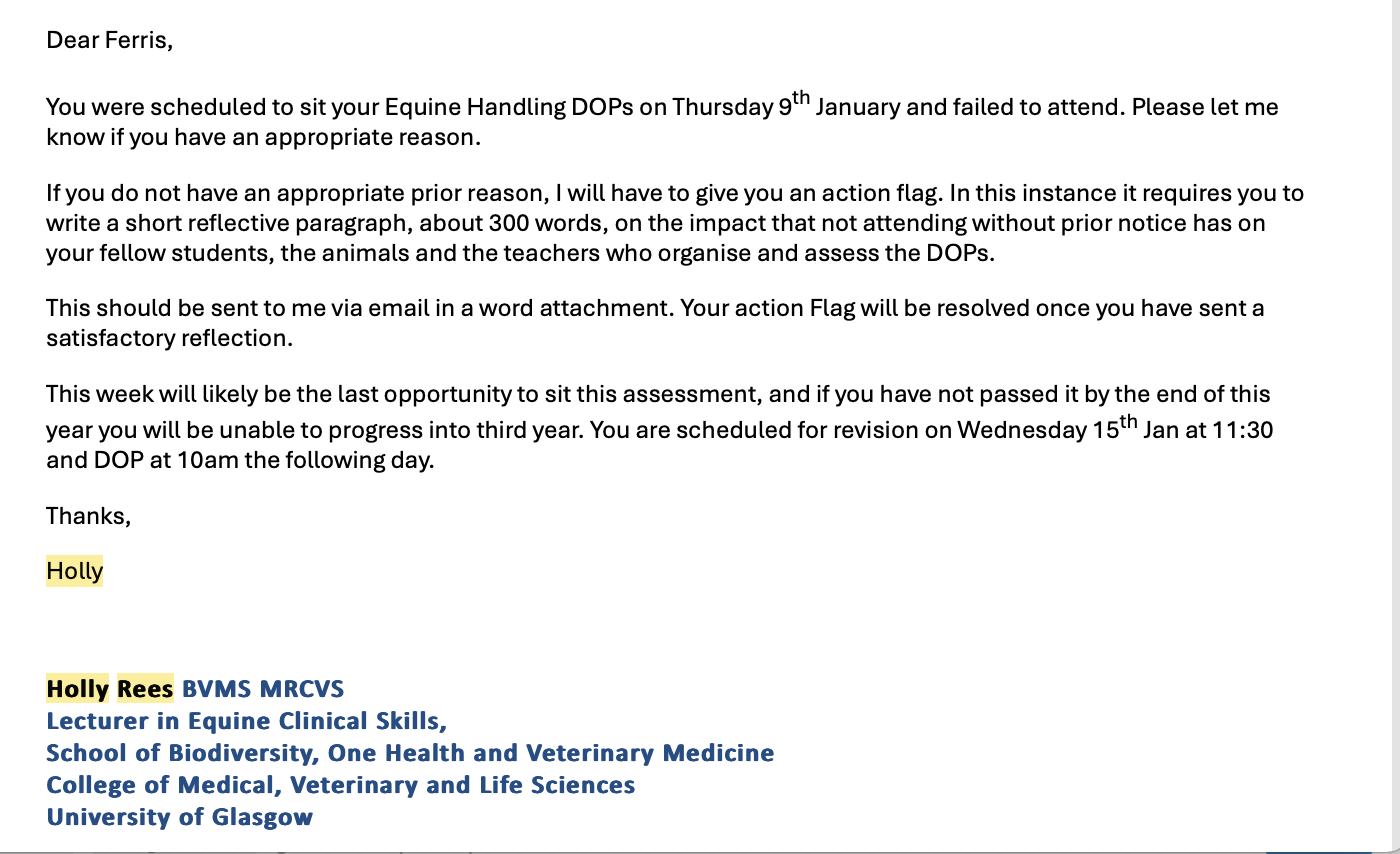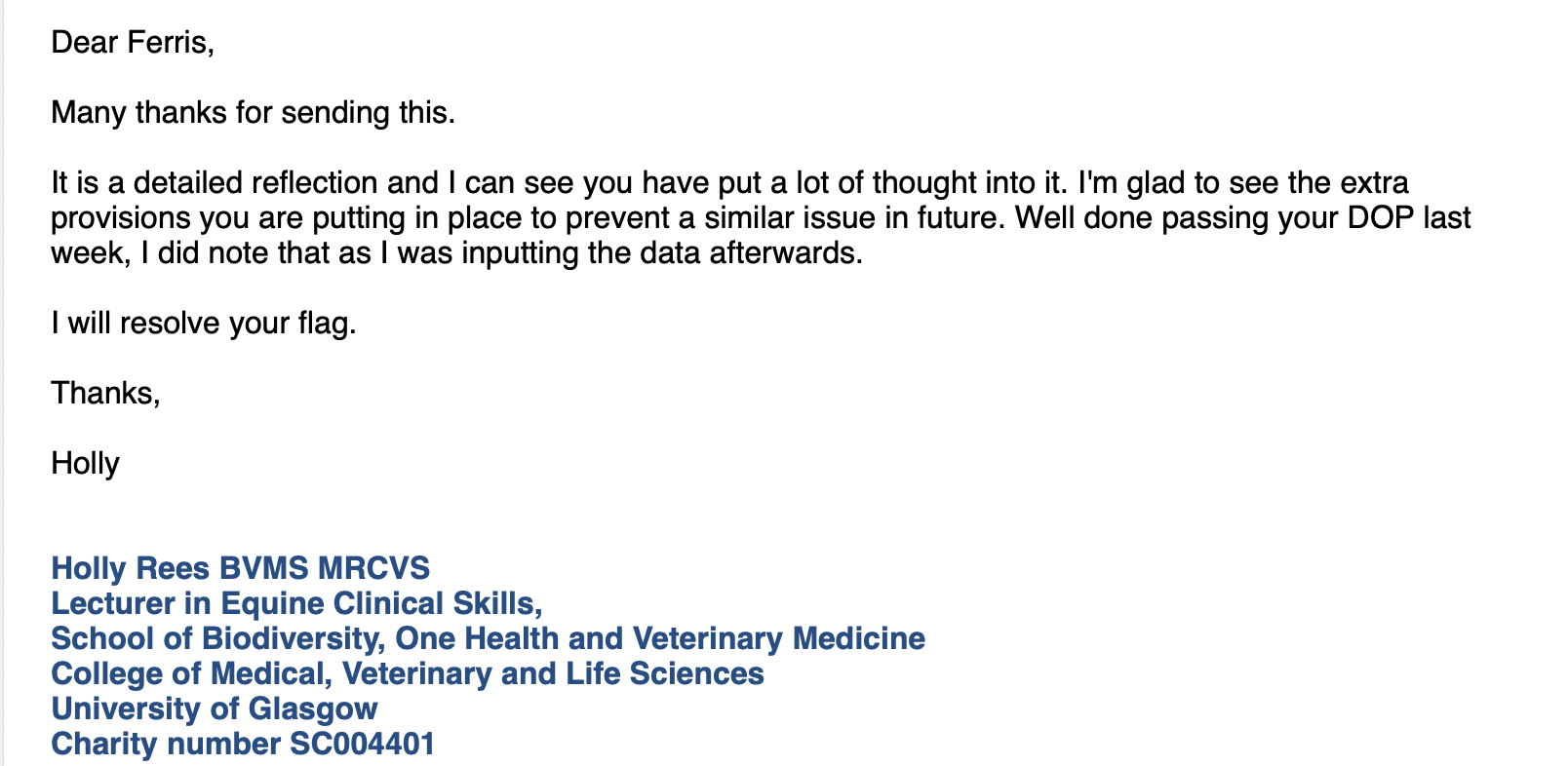Equine Handling DOPS Retake
Brief Description
This asset reflects on the experience of successfully retaking the Equine Handling DOPS assessment under significant pressure. Following an Action Flag incident related to missing a previously scheduled slot, this final attempt carried substantial academic weight. This reflection focuses on the preparation techniques employed, the management of performance anxiety, and the demonstration of core handling skills in a high-stakes environment.
Reflection
Having to retake the Equine Handling DOPS after the Action Flag incident felt overwhelming. It wasn't just another assessment; after struggling previously and then missing my scheduled slot (covered in the Action Flag reflection), this was my final chance for the year. Failing again risked repeating the entire year and facing additional tuition costs, placing immense pressure on me. Honestly, I was terrified.
Realizing the stakes, I knew I couldn't afford to be unprepared. The night before, I isolated myself and spent hours mentally rehearsing the entire procedure. Step-by-step, I visualized approaching the horse, fitting the headcollar, leading it correctly, and cleaning the hoof. I deliberately imagined potential complications like an uncooperative horse or forgetting steps, and mentally practiced handling them calmly. For instance, I visualized the horse suddenly pulling back while leading, picturing myself maintaining a firm but calm hold and using appropriate body positioning. I also rehearsed scenarios like the horse refusing to lift its hoof, imagining patient and gentle techniques to encourage cooperation. I aimed to internalize the process to a level where I could perform it almost automatically. Research suggests that such mental rehearsal or visualization enhances skill acquisition and performance under stress (Predoiu et al., 2020). It seemed like my best strategy.
On the day of the DOPS, I was extremely anxious. My heart was definitely racing, I was sweating slightly, and my hands were visibly trembling when I first approached the horse. The initial moments were incredibly tense, especially knowing the assessor was observing and aware of the consequences of another failure. However, as soon as I took hold of the headcollar and began walking towards the stall, something shifted. The detailed mental practice from the night before kicked in, providing a clear, structured focus that helped override the initial wave of anxiety, allowing a sense of calm determination to emerge.
I successfully performed each aspect of the DOPS. Gradually, my initial panic subsided, replaced by growing confidence with each completed step. I became more attuned to the horse, handling it effectively and calmly.
Passing the DOPS was an immense relief, but reflecting on the experience revealed deeper insights. Beyond simply passing, it affirmed my ability to execute essential Equine Handling skills even under extreme stress. Additionally, it reinforced the lessons learned from the Action Flag incident regarding responsibility, meticulous organization, and double-checking schedules. Most importantly, it solidified mental rehearsal as a powerful and effective preparation technique within my personal toolkit. This experience demonstrated the practical power of visualization, a tool I now intend to consciously apply to prepare for upcoming OSCEs and challenging clinical skills assessments throughout my veterinary career.
This experience significantly shaped my approach to preparation under pressure. The mental rehearsal genuinely helped maintain my focus amidst nerves. Knowing I could effectively manage such a high-stress situation increased my confidence for future assessments and challenging veterinary scenarios. More than just passing an assessment, this proved to myself that I could adapt and perform competently even when facing significant internal and external pressures, building a deeper trust in my ability to handle the inevitable stresses of clinical practice. Although difficult, successfully retaking the DOPS felt like a pivotal step toward becoming a competent veterinarian.
(532 words)Outcome Annotations
This experience contributed to my development in the following Foundation Phase Outcomes:
Annotations
Clinical Skills
Demonstrated competence in core Equine Handling skills (approaching, headcollar application, leading, hoof cleaning) under assessment conditions and significant pressure, reinforcing practical learning from course sessions.
Professional Attitude
Showcased resilience by preparing for and successfully completing a high-stakes assessment after a prior setback (Action Flag). Demonstrated commitment to learning and self-improvement through proactive preparation (mental rehearsal) and reflection on performance under pressure.
Supporting Materials & References
Equine Handling DOPS Form 1
Equine Handling DOPS Form 2
Action Flag Notification Email

Flag Resolution Confirmation Email

References
- • Predoiu, R., Predoiu, A., Mitrache, G., Firănescu, M., Cosma, G., Dinuţă, G., & Bucuroiu, R. A. (2020). VISUALISATION TECHNIQUES IN SPORT – THE MENTAL ROAD MAP FOR SUCCESS. Discobolul – Physical Education, Sport and Kinetotherapy Journal, 59(3), 245-256. https://doi.org/10.35189/dpeskj.2020.59.3.4